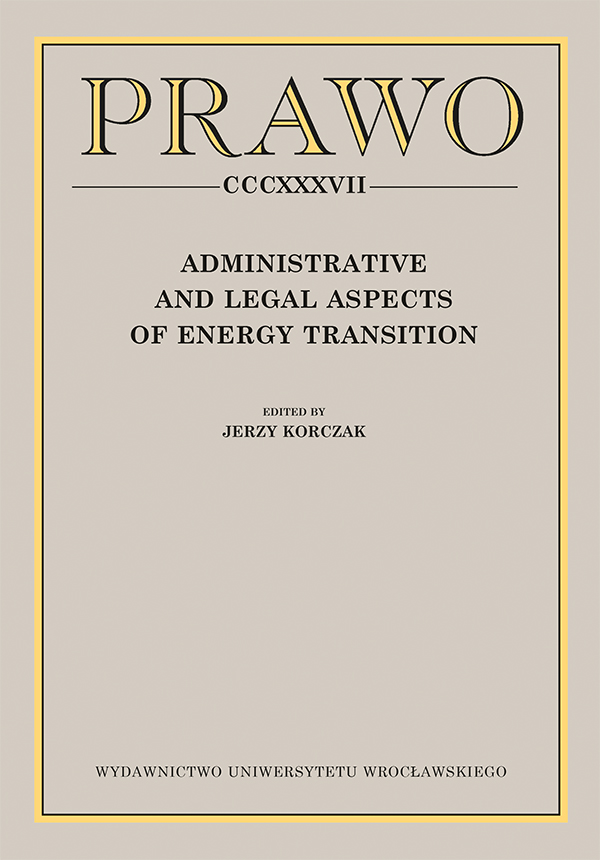

Artykuły

Energy efficiency, understood as measuring energy consumption, is an important element of the energy policy of the state, in particular because of the problem of energy overconsumption by a rapidly growing population and dynamic economic development, particularly with regard to emerging markets and developing countries. Therefore, the issue of energy efficiency requires appropriate legal regulation and a suitable policy pursued by the public authorities. The aim of the article is to describe energy efficiency in the context of the basic assumptions of the economic analysis of law, as well as the importance of the norms of public economic law in the social market economy. The analysis considers the regulatory frameworks of energy efficiency at the level of the European Union and the selected Member State, namely Poland.
Danmei Z., Mortazavi, Mostafa S., Akbar M., Alireza A., Hossein Y., “Analysis of the robustness of energy supply in Japan: Role of renewable energy,” Energy Reports 2020, no. 6, pp. 378–391.
Deffains, B. (2001), “Competition between legal systems: A comparative law and economics perspective,” [in:] Law and Economics in Civil Law Countries, eds. B. Deffains, T. Kirat, Amsterdam-London-New York-Oxford-Paris-Shannon-Tokyo 2001, pp. 9–22.
Drexl J., Idot L., Monéger J., Economic Theory and Competition Law, Cheltenham-Northampton 2009.
“Energy efficiency in the European Green Deal,” European Commission, 2021, https://ec.europa.eu/energy/topics/energy-efficiency/targets-directive-and-rules/energy-efficiency-directive_en#energy-efficiency-in-the-european-green-deal.
“The European environment – state and outlook 2020: knowledge for transition to a sustainable Europe,” European Environment Agency, 11.05.2020, https://www.eea.europa.eu/publications/soer-2020.
Garoupa, N. (2008), “Doing comparative law and economics: why the future is micro and not macro,” [in:] Essays in the Law and Economics of Regulation: In Honour of Anthony Ogus, eds. M. Faure, F. Stephen, Antwerpen-Oxford-Portland 2008, pp. 63–71.
Harnay, S., Vigouroux I., “Judicial competition, legal innovation and European integration: an economic analysis,” [in:] The Economics of Harmonizing European Law, eds. A. Marciano, J.M. Josselin, Cheltenham, Northampton, 2002, pp. 87–100.
Hasan A., Abubakar I.R., Rahman S.M., Aina Y., Chowdhury I., Khondaker A.N., “The synergy between climate change policies and national development goals: implications for sustainability,” Journal of Cleaner Production 2020, no. 249, 119369.
Oikonomou V., Becchis F., Steg L., Russolillo D., “Energy saving and energy efficiency concepts for policy making,” Energy Policy 11, 2009, no. 37, pp. 4787–4796.
Parrott K., “Energy conservation,” [in:] Sustainable Cities and Communities. Encyclopedia of the UN Sustainable Development Goals, eds. W. Leal Filho, A. Azul, L. Brandli, P. Özuyar, Cham, pp. 158–167.
Pollitt M.G., “The European single market in electricity: An economic assessment,” Review of Industrial Organization 2019, no. 55, pp. 63–87.
Posner R.A., Economic Analysis of Law, New York 2014.
Report from the Commission to the European Parliament and the Council 2019 – assessment of the progress made by Member States towards the national energy efficiency targets for 2020 and towards the implementation of the Energy Efficiency directive as required by article 24(3) of the Energy Efficiency directive 2012/27/eU, coM(2020) 326 final, European Commission, Brussels 2020, https://eur-lex.europa.eu/legal-content/en/tXt/PdF/?uri=ceLeX:52020dc0326&from=en.
Severin E., “The negotiation of disputed rights or how the law comes to economics,” [in:] Law and Economics in Civil Law Countries, eds. B. Deffains, T. Kirat, Amsterdam-London-New York-Oxford-Paris-Shannon-Tokyo 2001, pp. 43–60.
Wach K., Głodowska A., Maciejewski M., Sieja M., “Europeanization processes of the EU energy policy in Visegrad countries in the years 2005–2018,” Energies 2021, no. 14, 1802.